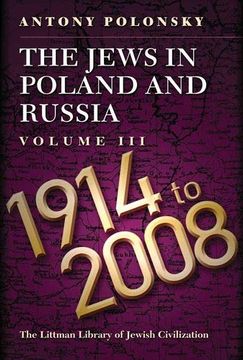The Jews in Poland and Russia: Volume Iii: 1914 to 2008 (Littman Library of Jewish Civilization)
Synopsis "The Jews in Poland and Russia: Volume Iii: 1914 to 2008 (Littman Library of Jewish Civilization)"
Antony Polonsky provides a comprehensive survey of the history - socio-political, economic, and religious - of the Jewish communities of eastern Europe from 1750, when the Polish - Lithuanian Commonwealth was the dominant political unit, to the present. Until the Second World War, this area was the heartland of the Jewish world: almost all the major movements which have characterized that world in recent times had their origins here, and it was home to the majority of the world's Jews. Nearly three and a half million lived in Poland alone, while nearly three million more lived in the Soviet Union. Although the majority of the Jews of Europe and the United States, and most of the Jews of Israel, originated from these lands, the history of their Jewish communities is not well known. Rather, it is the subject of mythologizing and stereotypes that fail both to bring out the specific features of the Jewish civilization which emerged here and to illustrate what was lost in the passage across the Channel and the Atlantic. Jewish life in these parts, though often poor materially, was marked by a high degree of spiritual and ideological intensity and creativity.Antony Polonsky recreates this lost world - brutally cut down by the Holocaust and less brutally but still seriously damaged by the Soviet attempt to destroy Jewish culture - in a way that avoids both sentimentalism and the simplification of the the east European Jewish experience into a story of persecution and martyrdom. Wherever possible, the unfolding of history is illustrated by contemporary Jewish writings to show how Jews felt and reacted to the complex and difficult situations in which they found themselves. It is an important story whose relevance reaches far beyond the Jewish world or the bounds of east-central Europe. Polonsky establishes the context with a review of Jewish life in Poland and Lithuania down to the mid-eighteenth century, describing the towns and shtetls where the Jews lived, the institutions they developed, and their participation in the economy. He also considers their religious and intellectual life, including the emergence of hasidism, and the growth of opposition to it. He then describes government attempts to integrate and transform the Jews in the period from 1764 to 1881 and the Jewish response to these efforts.He considers the impact of modernization and the beginnings of the Haskalah movement, and looks at developments in each area in turn: the problems of emancipation, acculturation, and assimilation in Prussian and Austrian Poland; the politics of integration in the Kingdom of Poland; and the failure of forced integration in the tsarist empire. The third part of the book considers the deterioration of the position of the Jews in the period from 1881 to 1914 and the new Jewish politics that led to the development of new movements: Zionism, socialism, autonomism, the emergence of modern Hebrew and Yiddish literature, Jewish urbanization, and the rise of Jewish mass culture. Galicia, Prussian Poland, the Kingdom of Poland, and the tsarist empire are all treated individually, as are the main towns. The final part deals with the twentieth century. Starting from the First World War and the establishment of the Soviet Union, it deals in turn with Poland, Lithuania, and the Soviet Union up to the Second World War. It then reviews Polish - Jewish relations during the Second World War and examines the Soviet record and the Holocaust.The final chapters deal with the Jews in the Soviet Union and in Poland since 1945, concluding with an epilogue on the Jews in Poland, Lithuania, Belarus, Ukraine, and Russia since the collapse of communism.

